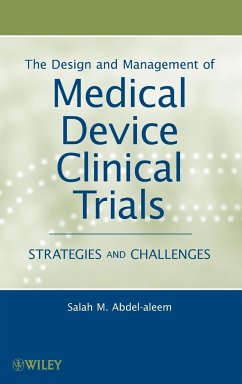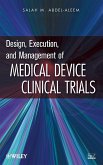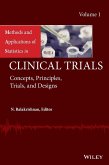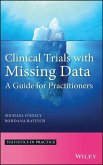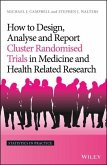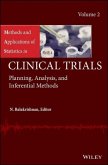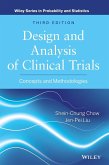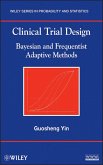Salah M. Abd-el-Aleem
Medical Device Clinical Trials
Salah M. Abd-el-Aleem
Medical Device Clinical Trials
- Gebundenes Buch
- Merkliste
- Auf die Merkliste
- Bewerten Bewerten
- Teilen
- Produkt teilen
- Produkterinnerung
- Produkterinnerung
Clinical trials tasks and activities are widely diverse and require certain skill sets to both plan and execute. This book provides professionals in the field of clinical research with valuable information on the challenging issues of the design, execution, and management of clinical trials, and how to resolve these issues effectively. It discusses key obstacles such as challenges to patient recruitment, investigator and study site selection, and dealing with compliance issues. Through practical examples, professionals working with medical device clinical trials will discover the appropriate steps to take.…mehr
Andere Kunden interessierten sich auch für
![Design, Execution, and Management of Medical Device Clinical Trials Design, Execution, and Management of Medical Device Clinical Trials]() Salah M Abdel-AleemDesign, Execution, and Management of Medical Device Clinical Trials135,99 €
Salah M Abdel-AleemDesign, Execution, and Management of Medical Device Clinical Trials135,99 €![MAS Clinical Trials v1 MAS Clinical Trials v1]() MAS Clinical Trials v1247,99 €
MAS Clinical Trials v1247,99 €![Clinical Trials with Missing D Clinical Trials with Missing D]() Michael O'KellyClinical Trials with Missing D115,99 €
Michael O'KellyClinical Trials with Missing D115,99 €![How to Design, Analyse and Report Cluster Randomised Trials in Medicine and Health Related Research How to Design, Analyse and Report Cluster Randomised Trials in Medicine and Health Related Research]() Michael J. CampbellHow to Design, Analyse and Report Cluster Randomised Trials in Medicine and Health Related Research117,99 €
Michael J. CampbellHow to Design, Analyse and Report Cluster Randomised Trials in Medicine and Health Related Research117,99 €![Methods and Applications of Statistics in Clinical Trials, Volume 2 Methods and Applications of Statistics in Clinical Trials, Volume 2]() Methods and Applications of Statistics in Clinical Trials, Volume 2247,99 €
Methods and Applications of Statistics in Clinical Trials, Volume 2247,99 €![Clinical Trials 3e Clinical Trials 3e]() Shein-Chung ChowClinical Trials 3e183,99 €
Shein-Chung ChowClinical Trials 3e183,99 €![Clinical Trial Design Clinical Trial Design]() Guosheng YinClinical Trial Design156,99 €
Guosheng YinClinical Trial Design156,99 €-
-
-
Clinical trials tasks and activities are widely diverse and require certain skill sets to both plan and execute. This book provides professionals in the field of clinical research with valuable information on the challenging issues of the design, execution, and management of clinical trials, and how to resolve these issues effectively. It discusses key obstacles such as challenges to patient recruitment, investigator and study site selection, and dealing with compliance issues. Through practical examples, professionals working with medical device clinical trials will discover the appropriate steps to take.
Hinweis: Dieser Artikel kann nur an eine deutsche Lieferadresse ausgeliefert werden.
Hinweis: Dieser Artikel kann nur an eine deutsche Lieferadresse ausgeliefert werden.
Produktdetails
- Produktdetails
- Verlag: Wiley & Sons
- Artikelnr. des Verlages: 14560225000
- 1. Auflage
- Seitenzahl: 272
- Erscheinungstermin: 9. August 2010
- Englisch
- Abmessung: 240mm x 161mm x 19mm
- Gewicht: 548g
- ISBN-13: 9780470602256
- ISBN-10: 0470602252
- Artikelnr.: 29337363
- Herstellerkennzeichnung
- Produktsicherheitsverantwortliche/r
- Europaallee 1
- 36244 Bad Hersfeld
- gpsr@libri.de
- Verlag: Wiley & Sons
- Artikelnr. des Verlages: 14560225000
- 1. Auflage
- Seitenzahl: 272
- Erscheinungstermin: 9. August 2010
- Englisch
- Abmessung: 240mm x 161mm x 19mm
- Gewicht: 548g
- ISBN-13: 9780470602256
- ISBN-10: 0470602252
- Artikelnr.: 29337363
- Herstellerkennzeichnung
- Produktsicherheitsverantwortliche/r
- Europaallee 1
- 36244 Bad Hersfeld
- gpsr@libri.de
SALAH M. ABDEL-ALEEM, PhD, is Senior Manager of Clinical Operations at Proteus Biomedical, Inc., a medical device and pharmaceutical company that develops therapies for cardiovascular and diabetic diseases.¿He has over twenty years of experience in academic and corporate settings and has performed clinical research tasks and activities, such as the development of clinical standard operating procedures, clinical protocols, case report forms, clinical study forms, and investigator brochures for various academic and corporate settings. Dr. Abdel-aleem is the author of Design, Execution, and Management of Medical Device Clinical Trials, also published by Wiley.
List of Abbreviations xi
Preface xiii
Acknowledgments xvii
1. Challenges to the Design of Clinical Study 1
Development of Clinical SOPs 3
Selection of Study Patients, Investigators, and Study Sites 3
Definition of Enrolled Subjects in a Clinical Study 7
Definition of the Investigational Device System 7
Research Contract Challenges 7
Review of Literature 9
Challenges to the Design of the Study Protocol, Statistical Analysis Plan
(SAP), and Selection of Study Endpoints 11
Masking or Blinding 12
Primary and Secondary Outcomes 14
Selection of Study Endpoints 14
Differences between the Primary Endpoint in FDA and CE Mark Studies 15
SAP and Study Endpoints 15
Components of the SAP for Clinical Trials 17
Roles and Responsibilities of the Clinical Personnel in Completing the
Study Protocol 19
Changing the Primary Outcome during the Conduct of the Study 20
Definition of Primary and Secondary Endpoints 22
Combined "Composite" Endpoints 22
Surrogate Endpoints 23
Reducing the Study's Sample Size 25
Statistical Terms to Define Endpoint Measurements 25
Reporting Results of Clinical Trials 28
Superiority and Equivalence Trials 30
Subgroup Analysis 33
Challenges to ICF 35
Risk/Benefit Analysis 41
2. Challenges to Managing the Study 43
Enhancing Patient Enrollment by Relaxation of Study Criteria 45
Compliance with the Study Protocol 46
Challenges Associated with Data Accuracy and Completeness 47
Data Analysis 49
Data Integrity 55
Criteria for Using Meta-Analysis Studies 56
Who Should have Access to Clinical Trial Records 57
Managing Study Data and Quality Assurance 58
Missing Data Analysis 59
Examination of Data across Study Sites 60
Challenges to Adverse Event Reporting 62
Adverse Event Coding Systems 66
Protocol Deviation Report 68
Adverse Event Reporting in Final Study Clinical Report 68
Difference between the US and EU Definitions and Reporting of Adverse
Events 69
Adverse Event Reporting Challenges 69
Minimization of Bias in Clinical Trials 69
3. Selection of Historic Controls 71
Types of Control Group in Medical Device Clinical Trials 73
Purpose of Control Group 73
Use of Placebo Control 74
Advantages of Randomized Control Clinical Trials 74
Disadvantages of Randomized Control Clinical Trials 74
Commonly Used Pivotal Designs 75
Definition of Historic Control 77
Objective Performance Criteria (OPC) 78
Examples of Clinical Studies with Historic Controls 80
LACI Clinical Study 80
Left Ventricular Assist Devices 86
Summary of Clinical Studies 88
Summary of Recommendations for Historic Control 96
4. Fraud and Misconduct in Clinical Trials 99
Fraud and Misconduct in Clinical Trials 100
Warning Signs of Fraud 101
Tips for Detecting Serious Misconduct 102
False Claims Act 102
Fraud Prevention 103
Policy on Handling Complaints of Misconduct 103
Reporting Research Misconduct 104
Bioresearch Monitoring Information System (BMIS) 104
5. Challenges to the Regulation of Medical Device 107
Determination of 510(K) Devices 108
510(K) "Substantial Equivalence Decision Making Process" 111
Determination of Nonsignificant Risk Devices (NSR) 111
Similarities and Differences between Medical Device and Drug Regulations in
Clinical Trials 112
Definitions of Drugs and Devices 113
Combination Products 126
FDA-Sponsor Meetings 129
BIMO Inspection 130
Investigator-Initiated Clinical Trials 132
6. Challenges of Global Clinical Studies and the CE Mark Process 137
Global Trial Considerations 138
Global Harmonization Task Force Challenges 142
FDA Recommendations on Acceptance of Foreign Clinical Sites 143
Operational Tips on Conductance of Global Clinical Trials 143
CE Mark Process and Challenges 146
International Standard ISO 14155 148
Differences between FDA and CE Mark Clinical Trials 157
Challenges to CE Mark Studies 160
7. Challenging FDA PMA Cases 163
PMA P970029 (TMR 2000 Holmium Laser System) 164
PMA P040012 Carotid Stenting for Treating Carotid Disease 175
Historic Control Assumptions 175
Use of Angiographic Late Loss as Primary Endpoint in Drug-Eluting Stent PMA
P070015 (Xience V DES) 186
8. Bioethics in Clinical Research 199
Bioethical Challenges in Clinical Studies 200
Good Clinical Practice for the Investigator 201
WHO Principles of GCP 202
Guidelines and Ethical Principles 204
IRB Review Process 206
Glossary of Clinical, CE Mark, and Statistical Terms 211
References 217
Index 221
Preface xiii
Acknowledgments xvii
1. Challenges to the Design of Clinical Study 1
Development of Clinical SOPs 3
Selection of Study Patients, Investigators, and Study Sites 3
Definition of Enrolled Subjects in a Clinical Study 7
Definition of the Investigational Device System 7
Research Contract Challenges 7
Review of Literature 9
Challenges to the Design of the Study Protocol, Statistical Analysis Plan
(SAP), and Selection of Study Endpoints 11
Masking or Blinding 12
Primary and Secondary Outcomes 14
Selection of Study Endpoints 14
Differences between the Primary Endpoint in FDA and CE Mark Studies 15
SAP and Study Endpoints 15
Components of the SAP for Clinical Trials 17
Roles and Responsibilities of the Clinical Personnel in Completing the
Study Protocol 19
Changing the Primary Outcome during the Conduct of the Study 20
Definition of Primary and Secondary Endpoints 22
Combined "Composite" Endpoints 22
Surrogate Endpoints 23
Reducing the Study's Sample Size 25
Statistical Terms to Define Endpoint Measurements 25
Reporting Results of Clinical Trials 28
Superiority and Equivalence Trials 30
Subgroup Analysis 33
Challenges to ICF 35
Risk/Benefit Analysis 41
2. Challenges to Managing the Study 43
Enhancing Patient Enrollment by Relaxation of Study Criteria 45
Compliance with the Study Protocol 46
Challenges Associated with Data Accuracy and Completeness 47
Data Analysis 49
Data Integrity 55
Criteria for Using Meta-Analysis Studies 56
Who Should have Access to Clinical Trial Records 57
Managing Study Data and Quality Assurance 58
Missing Data Analysis 59
Examination of Data across Study Sites 60
Challenges to Adverse Event Reporting 62
Adverse Event Coding Systems 66
Protocol Deviation Report 68
Adverse Event Reporting in Final Study Clinical Report 68
Difference between the US and EU Definitions and Reporting of Adverse
Events 69
Adverse Event Reporting Challenges 69
Minimization of Bias in Clinical Trials 69
3. Selection of Historic Controls 71
Types of Control Group in Medical Device Clinical Trials 73
Purpose of Control Group 73
Use of Placebo Control 74
Advantages of Randomized Control Clinical Trials 74
Disadvantages of Randomized Control Clinical Trials 74
Commonly Used Pivotal Designs 75
Definition of Historic Control 77
Objective Performance Criteria (OPC) 78
Examples of Clinical Studies with Historic Controls 80
LACI Clinical Study 80
Left Ventricular Assist Devices 86
Summary of Clinical Studies 88
Summary of Recommendations for Historic Control 96
4. Fraud and Misconduct in Clinical Trials 99
Fraud and Misconduct in Clinical Trials 100
Warning Signs of Fraud 101
Tips for Detecting Serious Misconduct 102
False Claims Act 102
Fraud Prevention 103
Policy on Handling Complaints of Misconduct 103
Reporting Research Misconduct 104
Bioresearch Monitoring Information System (BMIS) 104
5. Challenges to the Regulation of Medical Device 107
Determination of 510(K) Devices 108
510(K) "Substantial Equivalence Decision Making Process" 111
Determination of Nonsignificant Risk Devices (NSR) 111
Similarities and Differences between Medical Device and Drug Regulations in
Clinical Trials 112
Definitions of Drugs and Devices 113
Combination Products 126
FDA-Sponsor Meetings 129
BIMO Inspection 130
Investigator-Initiated Clinical Trials 132
6. Challenges of Global Clinical Studies and the CE Mark Process 137
Global Trial Considerations 138
Global Harmonization Task Force Challenges 142
FDA Recommendations on Acceptance of Foreign Clinical Sites 143
Operational Tips on Conductance of Global Clinical Trials 143
CE Mark Process and Challenges 146
International Standard ISO 14155 148
Differences between FDA and CE Mark Clinical Trials 157
Challenges to CE Mark Studies 160
7. Challenging FDA PMA Cases 163
PMA P970029 (TMR 2000 Holmium Laser System) 164
PMA P040012 Carotid Stenting for Treating Carotid Disease 175
Historic Control Assumptions 175
Use of Angiographic Late Loss as Primary Endpoint in Drug-Eluting Stent PMA
P070015 (Xience V DES) 186
8. Bioethics in Clinical Research 199
Bioethical Challenges in Clinical Studies 200
Good Clinical Practice for the Investigator 201
WHO Principles of GCP 202
Guidelines and Ethical Principles 204
IRB Review Process 206
Glossary of Clinical, CE Mark, and Statistical Terms 211
References 217
Index 221
List of Abbreviations xi
Preface xiii
Acknowledgments xvii
1. Challenges to the Design of Clinical Study 1
Development of Clinical SOPs 3
Selection of Study Patients, Investigators, and Study Sites 3
Definition of Enrolled Subjects in a Clinical Study 7
Definition of the Investigational Device System 7
Research Contract Challenges 7
Review of Literature 9
Challenges to the Design of the Study Protocol, Statistical Analysis Plan
(SAP), and Selection of Study Endpoints 11
Masking or Blinding 12
Primary and Secondary Outcomes 14
Selection of Study Endpoints 14
Differences between the Primary Endpoint in FDA and CE Mark Studies 15
SAP and Study Endpoints 15
Components of the SAP for Clinical Trials 17
Roles and Responsibilities of the Clinical Personnel in Completing the
Study Protocol 19
Changing the Primary Outcome during the Conduct of the Study 20
Definition of Primary and Secondary Endpoints 22
Combined "Composite" Endpoints 22
Surrogate Endpoints 23
Reducing the Study's Sample Size 25
Statistical Terms to Define Endpoint Measurements 25
Reporting Results of Clinical Trials 28
Superiority and Equivalence Trials 30
Subgroup Analysis 33
Challenges to ICF 35
Risk/Benefit Analysis 41
2. Challenges to Managing the Study 43
Enhancing Patient Enrollment by Relaxation of Study Criteria 45
Compliance with the Study Protocol 46
Challenges Associated with Data Accuracy and Completeness 47
Data Analysis 49
Data Integrity 55
Criteria for Using Meta-Analysis Studies 56
Who Should have Access to Clinical Trial Records 57
Managing Study Data and Quality Assurance 58
Missing Data Analysis 59
Examination of Data across Study Sites 60
Challenges to Adverse Event Reporting 62
Adverse Event Coding Systems 66
Protocol Deviation Report 68
Adverse Event Reporting in Final Study Clinical Report 68
Difference between the US and EU Definitions and Reporting of Adverse
Events 69
Adverse Event Reporting Challenges 69
Minimization of Bias in Clinical Trials 69
3. Selection of Historic Controls 71
Types of Control Group in Medical Device Clinical Trials 73
Purpose of Control Group 73
Use of Placebo Control 74
Advantages of Randomized Control Clinical Trials 74
Disadvantages of Randomized Control Clinical Trials 74
Commonly Used Pivotal Designs 75
Definition of Historic Control 77
Objective Performance Criteria (OPC) 78
Examples of Clinical Studies with Historic Controls 80
LACI Clinical Study 80
Left Ventricular Assist Devices 86
Summary of Clinical Studies 88
Summary of Recommendations for Historic Control 96
4. Fraud and Misconduct in Clinical Trials 99
Fraud and Misconduct in Clinical Trials 100
Warning Signs of Fraud 101
Tips for Detecting Serious Misconduct 102
False Claims Act 102
Fraud Prevention 103
Policy on Handling Complaints of Misconduct 103
Reporting Research Misconduct 104
Bioresearch Monitoring Information System (BMIS) 104
5. Challenges to the Regulation of Medical Device 107
Determination of 510(K) Devices 108
510(K) "Substantial Equivalence Decision Making Process" 111
Determination of Nonsignificant Risk Devices (NSR) 111
Similarities and Differences between Medical Device and Drug Regulations in
Clinical Trials 112
Definitions of Drugs and Devices 113
Combination Products 126
FDA-Sponsor Meetings 129
BIMO Inspection 130
Investigator-Initiated Clinical Trials 132
6. Challenges of Global Clinical Studies and the CE Mark Process 137
Global Trial Considerations 138
Global Harmonization Task Force Challenges 142
FDA Recommendations on Acceptance of Foreign Clinical Sites 143
Operational Tips on Conductance of Global Clinical Trials 143
CE Mark Process and Challenges 146
International Standard ISO 14155 148
Differences between FDA and CE Mark Clinical Trials 157
Challenges to CE Mark Studies 160
7. Challenging FDA PMA Cases 163
PMA P970029 (TMR 2000 Holmium Laser System) 164
PMA P040012 Carotid Stenting for Treating Carotid Disease 175
Historic Control Assumptions 175
Use of Angiographic Late Loss as Primary Endpoint in Drug-Eluting Stent PMA
P070015 (Xience V DES) 186
8. Bioethics in Clinical Research 199
Bioethical Challenges in Clinical Studies 200
Good Clinical Practice for the Investigator 201
WHO Principles of GCP 202
Guidelines and Ethical Principles 204
IRB Review Process 206
Glossary of Clinical, CE Mark, and Statistical Terms 211
References 217
Index 221
Preface xiii
Acknowledgments xvii
1. Challenges to the Design of Clinical Study 1
Development of Clinical SOPs 3
Selection of Study Patients, Investigators, and Study Sites 3
Definition of Enrolled Subjects in a Clinical Study 7
Definition of the Investigational Device System 7
Research Contract Challenges 7
Review of Literature 9
Challenges to the Design of the Study Protocol, Statistical Analysis Plan
(SAP), and Selection of Study Endpoints 11
Masking or Blinding 12
Primary and Secondary Outcomes 14
Selection of Study Endpoints 14
Differences between the Primary Endpoint in FDA and CE Mark Studies 15
SAP and Study Endpoints 15
Components of the SAP for Clinical Trials 17
Roles and Responsibilities of the Clinical Personnel in Completing the
Study Protocol 19
Changing the Primary Outcome during the Conduct of the Study 20
Definition of Primary and Secondary Endpoints 22
Combined "Composite" Endpoints 22
Surrogate Endpoints 23
Reducing the Study's Sample Size 25
Statistical Terms to Define Endpoint Measurements 25
Reporting Results of Clinical Trials 28
Superiority and Equivalence Trials 30
Subgroup Analysis 33
Challenges to ICF 35
Risk/Benefit Analysis 41
2. Challenges to Managing the Study 43
Enhancing Patient Enrollment by Relaxation of Study Criteria 45
Compliance with the Study Protocol 46
Challenges Associated with Data Accuracy and Completeness 47
Data Analysis 49
Data Integrity 55
Criteria for Using Meta-Analysis Studies 56
Who Should have Access to Clinical Trial Records 57
Managing Study Data and Quality Assurance 58
Missing Data Analysis 59
Examination of Data across Study Sites 60
Challenges to Adverse Event Reporting 62
Adverse Event Coding Systems 66
Protocol Deviation Report 68
Adverse Event Reporting in Final Study Clinical Report 68
Difference between the US and EU Definitions and Reporting of Adverse
Events 69
Adverse Event Reporting Challenges 69
Minimization of Bias in Clinical Trials 69
3. Selection of Historic Controls 71
Types of Control Group in Medical Device Clinical Trials 73
Purpose of Control Group 73
Use of Placebo Control 74
Advantages of Randomized Control Clinical Trials 74
Disadvantages of Randomized Control Clinical Trials 74
Commonly Used Pivotal Designs 75
Definition of Historic Control 77
Objective Performance Criteria (OPC) 78
Examples of Clinical Studies with Historic Controls 80
LACI Clinical Study 80
Left Ventricular Assist Devices 86
Summary of Clinical Studies 88
Summary of Recommendations for Historic Control 96
4. Fraud and Misconduct in Clinical Trials 99
Fraud and Misconduct in Clinical Trials 100
Warning Signs of Fraud 101
Tips for Detecting Serious Misconduct 102
False Claims Act 102
Fraud Prevention 103
Policy on Handling Complaints of Misconduct 103
Reporting Research Misconduct 104
Bioresearch Monitoring Information System (BMIS) 104
5. Challenges to the Regulation of Medical Device 107
Determination of 510(K) Devices 108
510(K) "Substantial Equivalence Decision Making Process" 111
Determination of Nonsignificant Risk Devices (NSR) 111
Similarities and Differences between Medical Device and Drug Regulations in
Clinical Trials 112
Definitions of Drugs and Devices 113
Combination Products 126
FDA-Sponsor Meetings 129
BIMO Inspection 130
Investigator-Initiated Clinical Trials 132
6. Challenges of Global Clinical Studies and the CE Mark Process 137
Global Trial Considerations 138
Global Harmonization Task Force Challenges 142
FDA Recommendations on Acceptance of Foreign Clinical Sites 143
Operational Tips on Conductance of Global Clinical Trials 143
CE Mark Process and Challenges 146
International Standard ISO 14155 148
Differences between FDA and CE Mark Clinical Trials 157
Challenges to CE Mark Studies 160
7. Challenging FDA PMA Cases 163
PMA P970029 (TMR 2000 Holmium Laser System) 164
PMA P040012 Carotid Stenting for Treating Carotid Disease 175
Historic Control Assumptions 175
Use of Angiographic Late Loss as Primary Endpoint in Drug-Eluting Stent PMA
P070015 (Xience V DES) 186
8. Bioethics in Clinical Research 199
Bioethical Challenges in Clinical Studies 200
Good Clinical Practice for the Investigator 201
WHO Principles of GCP 202
Guidelines and Ethical Principles 204
IRB Review Process 206
Glossary of Clinical, CE Mark, and Statistical Terms 211
References 217
Index 221

